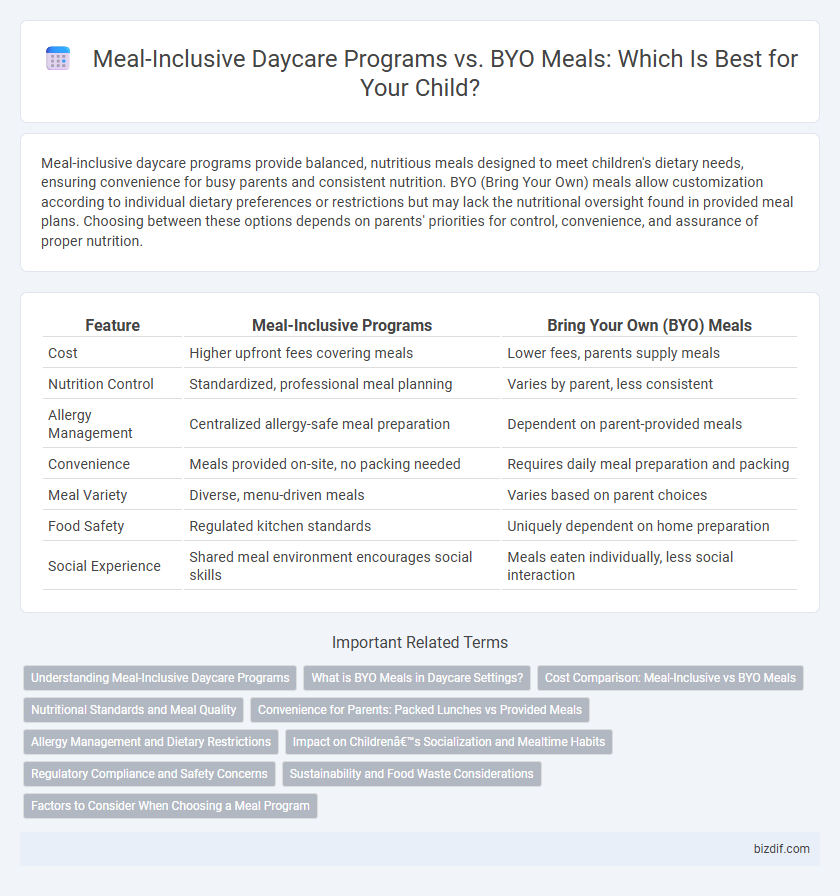Meal-inclusive daycare programs provide balanced, nutritious meals designed to meet children's dietary needs, ensuring convenience for busy parents and consistent nutrition. BYO (Bring Your Own) meals allow customization according to individual dietary preferences or restrictions but may lack the nutritional oversight found in provided meal plans. Choosing between these options depends on parents' priorities for control, convenience, and assurance of proper nutrition.
Table of Comparison
| Feature | Meal-Inclusive Programs | Bring Your Own (BYO) Meals |
|---|---|---|
| Cost | Higher upfront fees covering meals | Lower fees, parents supply meals |
| Nutrition Control | Standardized, professional meal planning | Varies by parent, less consistent |
| Allergy Management | Centralized allergy-safe meal preparation | Dependent on parent-provided meals |
| Convenience | Meals provided on-site, no packing needed | Requires daily meal preparation and packing |
| Meal Variety | Diverse, menu-driven meals | Varies based on parent choices |
| Food Safety | Regulated kitchen standards | Uniquely dependent on home preparation |
| Social Experience | Shared meal environment encourages social skills | Meals eaten individually, less social interaction |
Understanding Meal-Inclusive Daycare Programs
Meal-inclusive daycare programs provide balanced, nutritious meals prepared on-site, ensuring children receive age-appropriate portions that meet dietary guidelines and support healthy development. These programs reduce parents' burden of meal prep and guarantee food safety standards, accommodating allergies and special dietary needs through professional oversight. Parents benefit from consistent mealtime routines and nutritional transparency, often documented through detailed menu plans and daily meal reports.
What is BYO Meals in Daycare Settings?
BYO (Bring Your Own) meals in daycare settings require parents to provide prepared food for their children, allowing greater control over dietary preferences and restrictions. This approach can accommodate allergies, cultural dietary needs, and specific nutrition plans tailored to each child. Daycare centers implementing BYO meal policies often establish guidelines to ensure balanced nutrition and food safety compliance throughout the day.
Cost Comparison: Meal-Inclusive vs BYO Meals
Meal-inclusive daycare programs typically have higher upfront costs but offer convenience and balanced nutrition, reducing the need for parents to prepare meals. BYO (Bring Your Own) meal options may lower daycare fees but can lead to additional expenses and effort for families, especially when accounting for varied dietary needs and food preparation time. Evaluating total cost-effectiveness depends on factors like meal quality, parental time investment, and potential food waste in BYO scenarios.
Nutritional Standards and Meal Quality
Meal-inclusive daycare programs adhere to strict nutritional standards set by regulatory bodies, ensuring balanced meals rich in essential vitamins, minerals, and macronutrients tailored to children's developmental needs. These programs often employ qualified nutritionists to design menus that meet dietary guidelines, which enhances meal quality and supports healthy growth. In contrast, BYO meal policies place the responsibility of nutritional adequacy and variety on parents, risking inconsistent meal quality and potential gaps in essential nutrient intake.
Convenience for Parents: Packed Lunches vs Provided Meals
Meal-inclusive daycare programs offer significant convenience for parents by eliminating the need to prepare and pack lunches daily, saving time and reducing morning stress. Provided meals ensure children receive balanced, nutritionally planned food aligned with dietary guidelines, supporting health and development. In contrast, BYO meals require parents to manage food preparation and may raise concerns about nutritional adequacy and food safety.
Allergy Management and Dietary Restrictions
Meal-inclusive daycare programs provide tailored nutrition plans that address common allergies and dietary restrictions, ensuring safe and balanced meals for children. These programs often collaborate with nutritionists to create allergy-aware menus that prevent cross-contamination and accommodate gluten-free, dairy-free, and other specialized diets. In contrast, BYO meal policies place the responsibility of allergy and dietary management on parents, potentially increasing the risk of exposure to allergens and inconsistent nutritional quality.
Impact on Children’s Socialization and Mealtime Habits
Meal-inclusive daycare programs foster structured mealtime routines that encourage children to develop positive eating habits and social skills through shared dining experiences. BYO meals may limit opportunities for group interaction, potentially affecting children's ability to engage in social conversations and cooperative behaviors during meals. Consistent communal eating environments in daycare promote better nutrition awareness and enhance peer bonding essential for early childhood development.
Regulatory Compliance and Safety Concerns
Meal-inclusive daycare programs ensure strict adherence to local health regulations, minimizing risks of foodborne illnesses by providing nutritionally balanced and allergen-safe meals prepared under certified conditions. BYO (Bring Your Own) meal policies often require rigorous monitoring by staff to guarantee compliance with dietary restrictions and prevent cross-contamination, posing challenges to regulatory oversight. Prioritizing regulatory compliance and safety, meal-inclusive programs typically offer more controlled environments that reduce liability and support child nutrition standards effectively.
Sustainability and Food Waste Considerations
Meal-inclusive daycare programs reduce food waste by providing portion-controlled, nutritionally balanced meals designed to minimize excess. BYO meal policies often lead to inconsistent nutrition and increased waste as children may bring uneaten food from home, contributing to environmental impact. Sustainable daycare practices favor meal-inclusive options to streamline sourcing, reduce packaging waste, and ensure eco-friendly meal delivery.
Factors to Consider When Choosing a Meal Program
Choosing between meal-inclusive programs and BYO meals for daycare involves evaluating nutritional quality, dietary restrictions, and convenience for parents. Meal-inclusive programs often provide balanced, regulated meals that meet childcare nutritional standards, reducing parental stress. BYO meals offer customization and control over ingredients but require careful planning to ensure nutritional adequacy and food safety compliance.
Meal-inclusive programs vs BYO meals Infographic

 bizdif.com
bizdif.com